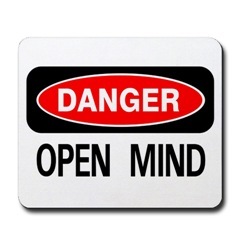 This blog-post comes straight from my gut and is the subject of a recent discussion I got to have with the wonderful Brett Hillman during a, too brief, Skype conversation a few nights ago. It’s a subject near, and dear, to my heart only in that it makes me chuckle whenever I see someone proudly bandy the concept about.
This blog-post comes straight from my gut and is the subject of a recent discussion I got to have with the wonderful Brett Hillman during a, too brief, Skype conversation a few nights ago. It’s a subject near, and dear, to my heart only in that it makes me chuckle whenever I see someone proudly bandy the concept about.
So here goes; No one should have to say how open-minded they are.
I’m probably alone in this belief or at least part of a very unpopular minority. Open-mindedness means a willingness to learn, observe, empathize, and listen; four actions that are evident in ones ability to ask questions, show intellectual and emotional vulnerability, take risks, and accept the likely occurrence of being wrong.
It is apparent in the way one speaks to others, one’s ability to engage in dialogue with those who may disagree, and how one may frame their arguments. It’s a rare trait shared by the likes of Sagan, Jung, or Einstein. Open-mindedness is knowledge, tempered with wisdom, and a splash of good old fashioned skepticism towards one’s self perceptions as well as the perceptions of others. A well-rounded appreciation of human infallibility.
It’s not a natural stat one can roll for. No religion , political party, social class, race, or sexual orientation gets a +5 to their open-mindedness upon character creation. No one group has a “tag” on being anymore open-minded than any other. I’ve met devout Catholics and staunch Republicans who deserved the banner more than some liberal band-wagoners who trumpet the term as if it’s the only redeeming quality in their arsenal of personal achievement.
In the end open-mindedness is an asset but it’s not an end all be all and it’s not something that is attained by simply saying one has the trait. It is cultivated, nurtured, curb-stomped a few times, put in the dryer, and pulled out two sizes too small. It’s then restitched, reassessed, and trudged out again, this time with less filler and more natural material.
This state of receptivity is merely a jumping off point leading towards inquiry, experimentation, research, and analysis. Open-Mindedness does not mean a lack of critical thinking skills or the current new age predilection for claiming all things have ‘validity’ when many things do not. There is a big difference between curiosity and plain social/intellectual lying.
Finally, like “honorable” or “priest/ess” this trait is not self-assignable. It is a subjective observation that can, at best, be given by an outsider looking in. With this in mind, out of all of the adjectives available to note the great thinkers, philosophers, and scientists, “open-minded” is rarely ever used.
In short, it’s modern usage has become little more than the shallow territory of the intellectual showman; very loud, but with very little to say.
So the next time you hear someone use this phrase-du-jour, perk your ears, squint your eyes, and really pay attention. Often, the dross you’ll end up with will be nothing like the treasures the individual will claim to possess.











